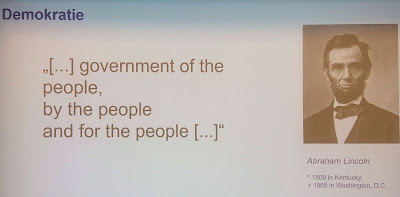It was a refreshing end to the series, as Professor Paulina Starski gave her talk in a charming, spirited, and convincing manner.
The normative bases of democracy are constitutional law and international law. The right to democracy is in Article 21 of our Grundgesetz (Basic Law), the Universal Declaration of Human Rights.
But Paulina wanted to present the structure of democracy in a legally clean way. She showed the audience that in a democracy, there are structural principles such as the federal state, republic, democracy, and the rule of law.
State objectives such as the welfare
state, care for the environment, and animal welfare are distinguished from
these structural principles.
Furthermore, in a democracy, there are objects of legitimacy, such as state
authority, and subjects of legitimacy, such as the people.
Red Baron learned that the Peace of Westphalia concluded in Münster and Osnabrück is regarded as the birth of international law. Read more.
States, peoples, and individual groups, such as Non-Governmental Organizations and International Organizations (IOs), are important subjects of international law.
International Organizations deal with cross-border problems. Thus, some competences of individual states are assigned to IOs. When states cede sovereign rights to IOs, these bodies will have a de facto and legal impact on domestic issues.
Article 23 (1) of the German GG (Basic Law) stipulates that the federal government can transfer sovereign rights to IOs by law with the approval of the Bundesrat (German Senate).

|
| Click to enlarge |
Prof. Starski spent the rest of her presentation on the relationship between individual states and the European Union (EU). The institutions are listed as:
European Parliament
European Council is a collegiate body that defines the overall political direction and priorities of the European Union.
Council of the European Union, also known as the Council of Ministers, is the second legislative body. Together with the European Parliament, it amends and approves or vetoes the proposals of the European Commission.
European Commission
European Court of Justice
European Central Bank
European Court of Auditors.
The institutional structure of the EU is complex.
On the democratic legitimacy of the EU, Paulina showed a couple of densely labeled slides that were difficult to read and digest during the presentation. I reproduce two of them here.
Paulina transferred Willy Brandt's famous call on her last slide: We should "dare more democracy" in the context of International Organizations.
I want to answer Paulina's call with a quote about democracy in the United Kingdom that I have never forgotten since my school days: "Our government system isn't one hundred percent democratic, but it works." My English teacher attributed the quote to Winston Churchill.
Churchill's statement, "Democracy is the worst form of Government except for all those other forms that have been tried from time to time," is better known and documented.
*















No comments:
Post a Comment